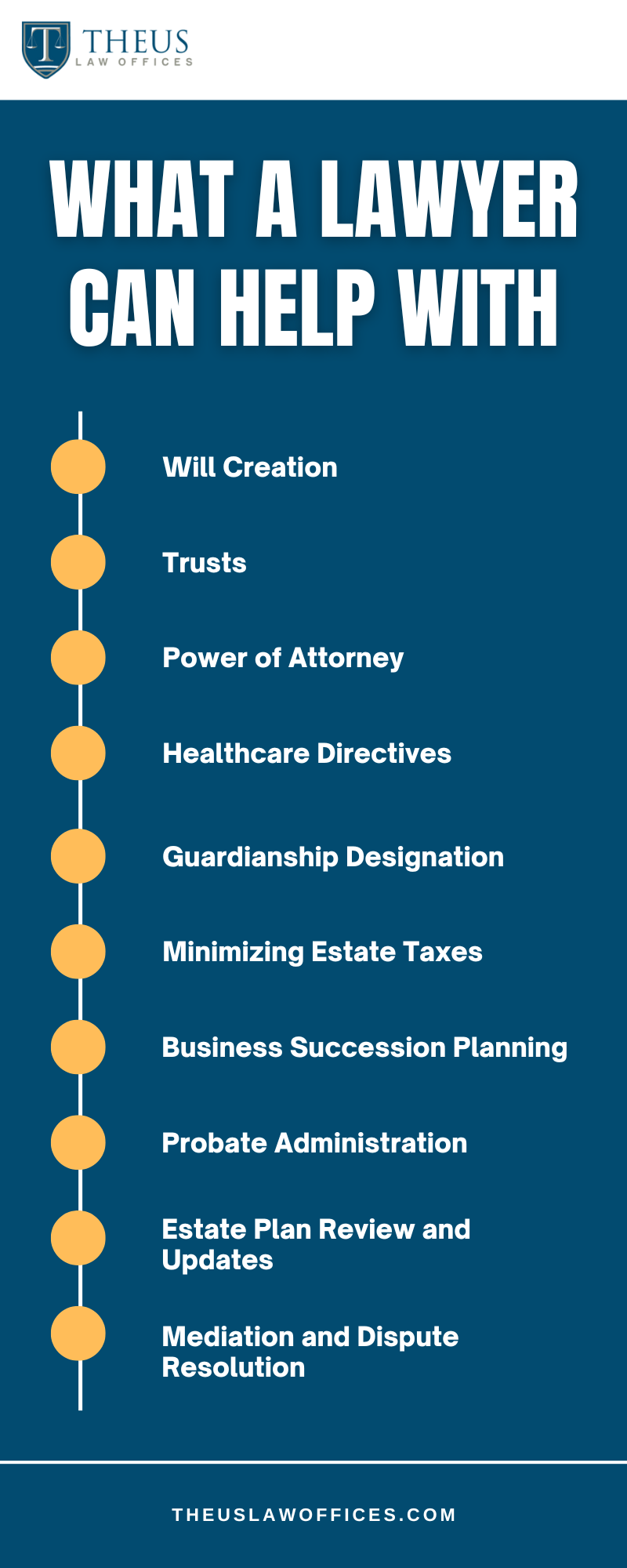If you are looking for a New Orleans, LA estate planning lawyer then you have come to the right place. Estate planning is a complex process and it is important to have the right lawyer by your side. A lawyer can help you make sure that your assets are properly taken care of after your death and that your wishes are honored. Learn more about how an attorney can help you, and then contact one at Theus Law Offices for help.
Table of Contents
- The Difference Between Wills and Trusts
- Updating Your Estate Plan
- Components of Your Estate Plan Our Lawyer Can Help With
- New Orleans Estate Planning Lawyer Infographic
- New Orleans Estate Planning Lawyer Statistics
- New Orleans Estate Planning Lawyer FAQs
- Contact Our New Orleans Estate Planning Lawyer Today
Estate planning is a process that involves creating a plan for your family, business, and property when you die or become incapacitated. Estate planning attorneys can help individuals create documents such as wills, trusts, living wills, power of attorney and other documents to ensure that the person's wishes are carried out after their death or incapacity. They can also help clients understand and manage their assets during their lifetime. A lawyer can provide guidance on how to properly and legally transfer assets, avoid probate court costs, minimize taxes, create trusts for beneficiaries, and protect assets from creditors. Additionally, estate planning attorneys can help clients create health care directives and powers of attorney that designate someone to make medical and financial decisions on the client's behalf in the event of a health care emergency.

The Difference Between Wills and Trusts
Understanding the differences between a will and a trust is a fundamental aspect of estate planning. At Theus Law Offices, we often encounter clients who are uncertain about these two key instruments and their distinct roles in asset management and distribution. Here, we aim to clarify these differences in a comprehensive and accessible manner.
Wills
A will, or a Last Will and Testament, is a legal document that outlines how your assets should be distributed after your death. It is a key component of estate planning that serves several important functions:
- Asset Distribution: It specifies how your assets, such as property, money, and personal items, will be divided among beneficiaries.
- Appointing Guardians: If you have minor children, a will allows you to appoint guardians to care for them in the event of your death.
- Naming an Executor: A will enables you to nominate an executor who will be responsible for managing your estate, paying debts, and distributing assets according to your wishes.
However, wills have certain limitations. They only take effect after your death and require a legal process called probate. Probate can be time-consuming and public, potentially leading to delays and reduced privacy for your estate and beneficiaries.
Trusts
A trust is a legal arrangement where a trustee holds and manages assets for beneficiaries. Unlike a will, a trust can take effect during your lifetime and offers several advantages:
- Avoiding Probate: A significant advantage of a trust is its ability to bypass the probate process, allowing for a quicker and more private distribution of assets.
- Flexibility and Control: Trusts offer greater control over how and when your assets are distributed. For example, you can specify that beneficiaries receive assets at certain ages or milestones.
- Protection During Incapacity: A trust can manage your affairs if you become incapacitated, something a will cannot do.
Trusts come in various forms, including revocable and irrevocable trusts, each serving different purposes and offering distinct advantages.
Comparing Wills and Trusts
- Effectiveness: A will takes effect only after death, while a trust can operate during your lifetime and after.
- Probate: Wills must go through probate, whereas properly funded trusts generally do not.
- Privacy: The probate process for wills is public, while trusts offer more privacy.
- Control and Management: Trusts provide more control over asset distribution and can manage assets during periods of incapacity.
- Complexity and Cost: Trusts are typically more complex and can be more expensive to set up than wills, but they can offer savings and convenience in the long run by avoiding probate.
Making the Right Choice
Deciding whether a will, a trust, or a combination of both is right for you depends on various factors, including the size and complexity of your estate, your privacy preferences, and how you wish to distribute your assets. At Theus Law Offices, we understand these decisions can be daunting. We are committed to providing clear, tailored advice to help you make informed decisions that align with your unique circumstances and estate planning goals.
The Benefits of Having an Estate Planning Attorney
Estate planning is an important aspect of life that can be complex and difficult to navigate. It's essential for every individual to have a comprehensive estate plan in place to protect their assets and provide for their family in the event of death or incapacity. Here are some of the key benefits of having a lawyer help you plan your estate:
- Lawyers are knowledgeable about the legal issues associated with estate planning. An experienced attorney will understand the laws and regulations associated with estate planning and how they might affect you and your loved ones.
- They can also provide invaluable advice on tax planning. With the right advice, you can potentially reduce your taxes and maximize your inheritance for your heirs.
- Everyone has different goals and desires when it comes to estate planning, so it's important to have a plan that takes those into account.
- They play an important role in ensuring that your assets are managed in a responsible manner during your lifetime. An experienced attorney can help you draft powers of attorney and other documents that will enable you to maintain control over your assets even if you become incapacitated.
Having a lawyer can provide peace of mind knowing that your affairs are taken care of properly and that your family will be taken care of in the event of death or incapacity. An experienced lawyer can help ensure that your wishes are legally sound and in compliance with state laws, helping you reduce taxes, maximize inheritance for heirs, and create a plan tailored to your unique needs. Contact a New Orleans estate planning lawyer at Theus Law Offices for help today.
Updating Your Estate Plan
Updating your estate plan is a crucial step in ensuring your assets and wishes are managed according to your preferences, not only at the end of your life but also if you become incapacitated. While there isn't a one-size-fits-all answer to how often you should update your estate plan, certain life events and timeframes serve as good indicators.
Initial Creation and Regular Reviews
First and foremost, if you haven't already created an estate plan, it's essential to do so regardless of your age or wealth status. At Theus Law Offices, we emphasize the importance of having an up-to-date estate plan that reflects your current circumstances and wishes. Once your estate plan is in place, a general rule of thumb is to review it every three to five years. This regular review ensures that any changes in your personal life, financial situation, or in the law are adequately reflected in your estate plan.
However, certain major life events warrant immediate updates to your estate plan:
Marriage or Divorce
If you marry or divorce, it's crucial to update your estate plan to reflect your current marital status. This includes revising beneficiaries on wills, trusts, insurance policies, and retirement accounts.
Birth or Adoption of a Child
The arrival of a new family member means adjusting your estate plan to include them as beneficiaries and considering guardianship arrangements.
Death of a Beneficiary or Executor
If a beneficiary or executor named in your will or trust passes away, updating these documents is necessary to ensure that your estate is managed as you intend.
Significant Changes in Assets
Acquiring or losing significant assets, such as buying a new home or receiving an inheritance, requires adjustments to your estate plan to accurately reflect your estate's value and distribution plans.
Changes in Tax Laws
Tax laws can impact various aspects of your estate plan. Staying informed and updating your plan accordingly is crucial to maximizing the benefits for your heirs and minimizing tax liabilities.
Changes in Relationships
Changes in your relationships with the people named in your estate plan, whether they are beneficiaries, executors, or trustees, might necessitate an update to your documents.
Moving to a Different State
Estate planning laws vary by state. If you move to a different state, review your estate plan with an attorney familiar with the laws in your new state.
The Importance of Professional Guidance
At Theus Law Offices, we understand that estate planning is a dynamic process. Our team is dedicated to providing professional guidance to ensure that your estate plan always aligns with your current needs and goals. We encourage you to reach out to us whenever you experience significant life changes, or simply when you feel it's time for a review.
The Consequences of an Outdated Estate Plan
An outdated estate plan can lead to unintended consequences, such as assets being distributed to unintended beneficiaries or in a manner contrary to your wishes. It can also cause unnecessary legal challenges and familial disputes, complicating what can already be a difficult time for your loved ones.
While there's no strict schedule for updating your estate plan, it's generally advisable to review it every three to five years and immediately following significant life events.
Components of Your Estate Plan Our Lawyer Can Help With
A trusted New Orleans, LA estate planning lawyer from Theus Law Offices can provide invaluable assistance in creating a comprehensive estate plan tailored to your specific needs and goals. Estate planning involves making important decisions about the distribution of your assets, guardianship for minor children, healthcare preferences, and more. Here's a look at what an estate planning lawyer can help you with in Louisiana:
- Will Creation
An estate planning lawyer will guide you through the process of drafting a legally valid will that reflects your wishes for asset distribution after your passing. They ensure that the will complies with Louisiana's specific requirements, such as the need for notarial execution.
- Trusts
If you wish to establish a trust to protect your assets, manage wealth, or provide for the needs of loved ones, an estate planning lawyer can help. They will explain the various trust options available in Louisiana, such as revocable living trusts, irrevocable trusts, special needs trusts, and more, and assist in creating and funding the trust.
- Power of Attorney
Estate planning lawyers can help you designate a trusted individual to act as your power of attorney. This grants them the authority to make financial or legal decisions on your behalf should you become incapacitated.
- Healthcare Directives
An estate planning lawyer can assist in creating advance healthcare directives, such as a living will and healthcare power of attorney. These documents specify your medical treatment preferences and designate someone to make medical decisions on your behalf if you are unable to do so.
- Guardianship Designation
If you have minor children, a New Orleans estate planning lawyer can help you establish a guardianship plan. They will work with you to designate a trusted individual to care for your children in the event of your untimely passing.
- Minimizing Estate Taxes
Estate planning lawyers are well-versed in the state's tax laws and can advise you on strategies to minimize estate taxes. They can explore options such as gifting, charitable giving, or creating tax-efficient trusts to preserve your assets for future generations.
- Business Succession Planning
If you own a business, an estate planning lawyer can help you develop a plan for the smooth transition of ownership and management. They can guide you in establishing buy-sell agreements, creating a succession plan, and ensuring the business's continued success in the future.
- Probate Administration
In the event of a loved one's passing, an estate planning lawyer can assist with the probate process. They will guide you through the legal requirements, help gather and value assets, pay outstanding debts and taxes, and distribute the estate to beneficiaries according to the will or state laws.
- Estate Plan Review and Updates
Life circumstances change over time, and an estate planning lawyer can review and update your estate plan as needed. They ensure that your plan remains current, reflecting any changes in family dynamics, assets, or laws that may impact your estate.
- Mediation and Dispute Resolution
In situations where conflicts arise among family members or beneficiaries regarding the estate, an estate planning lawyer can provide mediation and dispute resolution services. They work towards amicable resolutions, minimizing the need for costly and time-consuming litigation.
New Orleans Estate Planning Infographic
New Orleans Estate Planning Statistics
According to a survey conducted by Caring.com, more than 60 percent of Americans do not have wills drafted or any other estate planning tools in place. That comes out to two out of every three Americans. It is important to realize that if you do not have an estate plan in place specifying what should happen to your estate when you die, it will be distributed according to state law – and not necessarily how you would want it distributed. There is also the high risk of a long and dragged-out probate process if the family end up fighting over the state.
New Orleans Estate Planning FAQs
When Should I Talk to an Estate Planning Lawyer?
Working on an estate plan is important if you wish to make arrangements for your assets, as a New Orleans, LA estate planning lawyer can tell you. To ensure that your wishes are carried out and to protect your loved ones, it is advisable to consult with an estate planning lawyer. But when is the right time to seek their assistance? Ideally, it is best to talk to an estate planning lawyer as soon as possible, regardless of your age or the value of your assets. Life is unpredictable, and unfortunate events can happen unexpectedly. By engaging with an estate planning lawyer early on, you can create a solid plan that can be adjusted as circumstances change over time. This way, you can have peace of mind, knowing that your loved ones will be taken care of and your assets will be distributed according to your wishes.
What Documents Do I Need for an Estate Plan?
When crafting an estate plan, certain essential documents are typically included to ensure that your intentions are clear and legally binding. These documents may vary depending on your specific circumstances. A will outlines how you want your assets to be distributed after your death. It can also name a guardian for your minor children if applicable. Having a trust enables you to transfer your assets to the trustee who is authorized to manage them in the way that you want. Trusts can offer benefits such as privacy, avoiding probate, and potential tax advantages. A power of attorney is a document designating a person to make financial decisions on your behalf if you become incapacitated.
Why Is It Helpful to Include a Medical Directive?
Including a medical directive, such as an advance directive or living will, is crucial for ensuring that your healthcare wishes are respected in case you are unable to communicate them yourself. A medical directive allows you to specify your preferences for medical treatments, life-sustaining measures, and end-of-life care. By having these instructions documented, you relieve your loved ones from the burden of making difficult decisions during an already emotional and stressful time. As a Baton Rouge estate planning lawyer can explain, having this document also prevents disputes between family members and other parties who may have differing opinions regarding your care.
What Are the Costs of Estate Planning?
The cost of estate planning can vary depending on various factors, such as the complexity of your estate, the number of documents required, and the experience of the attorney you engage. Estate planning typically involves attorney fees, which can range from a few hundred to a few thousand dollars. Additional costs may include notary fees, filing fees, and fees associated with creating and maintaining trusts. While the cost of estate planning may seem like an expense, it is essential to consider the potential savings and benefits it can provide in the long run. Proper estate planning can help minimize estate taxes, avoid probate, and prevent family disputes that can be both emotionally and financially draining. For more information about legal services for estate planning, arrange a consultation with a seasoned Baton Rouge estate planning lawyer like one from Theus Law Offices.
How Can I Ensure My Assets Are Protected for My Loved Ones in the Event of My Passing?
Securing your assets for your loved ones is a vital aspect of estate planning. An estate planning lawyer in New Orleans, LA from Theus Law Offices can help you create a comprehensive plan that includes wills, trusts, and other legal instruments to safeguard your assets and ensure they are distributed according to your wishes.
Estate Planning Glossary
When preparing to protect your legacy, having the right legal tools in place is essential — especially when vehicles are part of your estate. A New Orleans, LA car estate planning lawyer can help address how your automobile assets should be handled after death or during incapacity. Whether it’s a personal vehicle, a vintage collection, or a company-owned fleet, proper planning ensures your intentions are carried out clearly and efficiently. Below, we define several key legal concepts that support this process.
Revocable Living Trust
A revocable living trust is a document that allows us to transfer ownership of property into a trust that we manage while we are still alive. This type of trust gives us the ability to amend, revoke, or change its terms at any time. After death or incapacity, the designated trustee steps in to manage or distribute the assets according to our instructions.
Revocable trusts are popular because they bypass probate. Assets placed in the trust during our lifetime are distributed directly to beneficiaries, without court involvement. We also use these trusts to provide ongoing financial management if we lose capacity. The trust becomes irrevocable after death, locking in the distribution plan we put in place.
Power Of Attorney
A power of attorney is a legal document that names a person to act on our behalf in financial or legal matters. This person, often referred to as the agent or attorney-in-fact, can step in to handle everything from banking to property transactions if we are no longer able to do so ourselves.
There are different types of powers of attorney. A general power of attorney offers broad authority, while a limited power of attorney is restricted to certain tasks or time periods. We often recommend a durable power of attorney, which stays in effect even if we become incapacitated. Without this document, loved ones may have to go through court proceedings to gain control over financial decisions.
Advance Healthcare Directive
An advance healthcare directive, sometimes called a living will or healthcare power of attorney, allows us to express our medical preferences in writing. It also lets us name a person to make medical decisions for us if we are unable to do so.
These documents give clarity to our healthcare providers and reduce the burden on family members during medical emergencies. Instructions may include choices about life-support measures, surgical interventions, or pain management. In Louisiana, we often use this directive to make clear who can speak for us and what kind of care we would or would not want.
Trust Funding
Trust funding refers to the process of transferring ownership of assets into a trust. Creating a trust is only the first step — it must be “funded” by formally retitling property and accounts in the name of the trust. This includes real estate, financial accounts, and other personal or business assets.
When we skip this step, the trust cannot control or distribute those assets as intended. Assets left outside the trust may still be subject to probate, defeating one of the trust’s key benefits. A properly funded trust helps avoid delays and preserves privacy by keeping asset distribution out of public court records.
Executor Nomination
Naming an executor in a will means selecting someone to carry out the instructions in our estate plan. This person will handle the administrative process after our passing, including paying debts, filing tax returns, and distributing assets to beneficiaries.
The executor must be trustworthy, organized, and capable of following legal procedures in the state of Louisiana. If no executor is named, or if the nominated person is unable to serve, the court will appoint someone — which may not reflect our preferences. Including an alternate executor can help avoid this outcome.
We believe that thoughtful estate planning is about more than just paperwork. It’s about protecting what matters most. At Theus Law Offices, we help families and individuals in New Orleans put legally sound plans in place that align with their goals and values.
Reach out to us today to schedule a confidential consultation and start building your estate plan with confidence.
Contact Our New Orleans Estate Planning Lawyer Today
Working with an estate planning lawyer allows you to navigate the complexities of estate planning with confidence. They ensure that your wishes are legally documented, provide expertise in tax and probate matters, and offer ongoing support to protect your interests and the well-being of your loved ones. Reach out to Theus Law Offices to speak with our trusted New Orleans estate planning lawyer now.
Are you ready to protect your assets and secure your family's future? Contact us today for a personalized consultation with our experienced estate planning lawyer in New Orleans, LA. Let us help you navigate the complexities of estate planning and ensure your wishes are honored. Your peace of mind is our priority.












